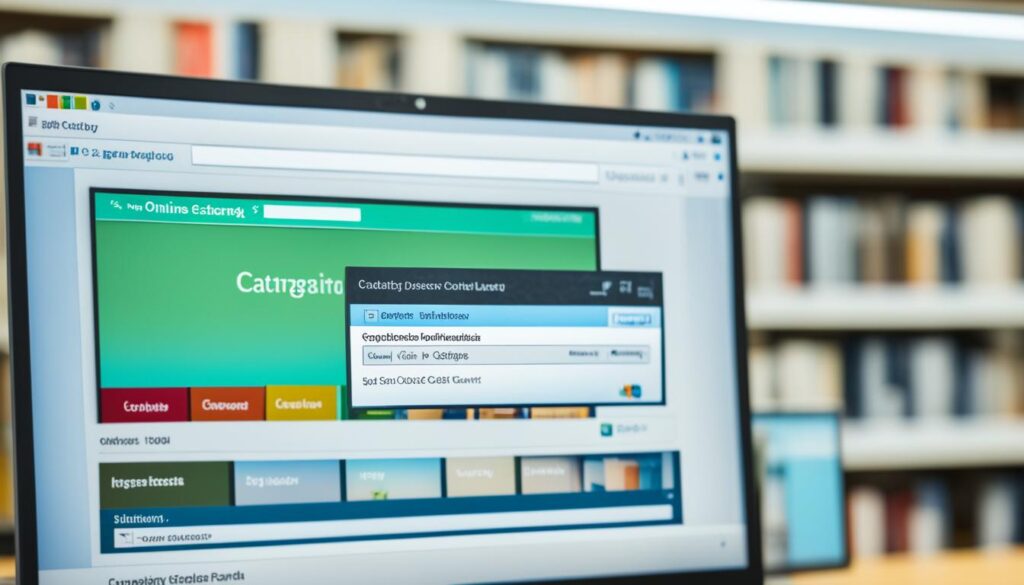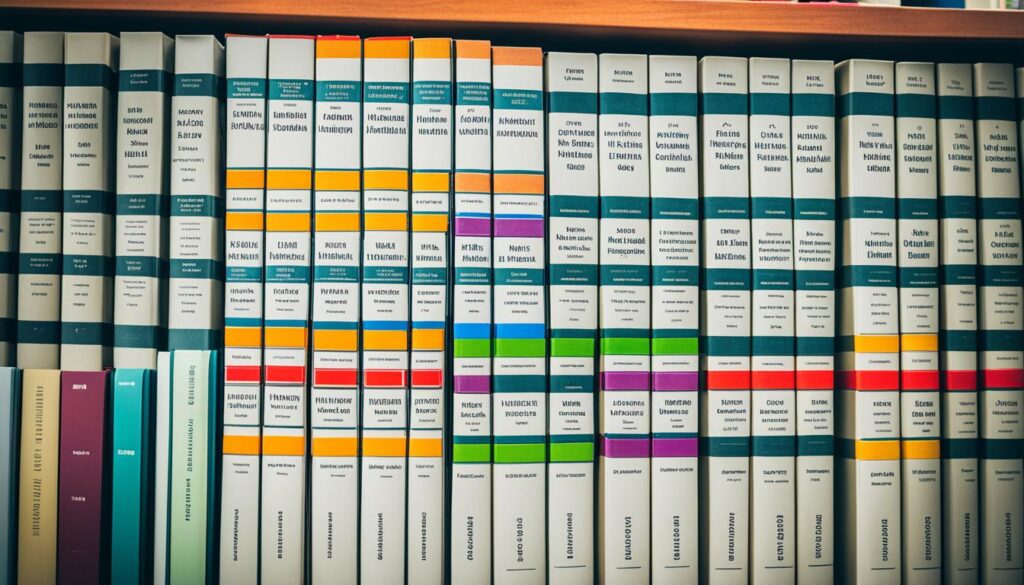Finding books in a university library might seem tough at first. But, with some tips, you can quickly find what you need for your studies. It’s important to get to know how the library is set up, its online catalog, and different collections. This makes finding books easier.
Key Takeaways
- Understand the Library of Congress Classification System and call numbers to locate books on the shelves.
- Search the library’s online catalog to find specific titles, authors, or subjects.
- Explore the main stacks, reference collection, and special collections to access a diverse range of resources.
- Utilize library staff and maps to navigate the facility and find what you need.
- Leverage services like interlibrary loan to access materials not available in your university library.
Understand Library Organization
University libraries use the Library of Congress Classification System to organize books. This system gives each book a unique call number based on its subject. These call numbers help arrange books in order. Knowing how this system works helps you find what you need in the library.
Library of Congress Classification System
The Library of Congress Classification System breaks knowledge into broad categories. It then splits these into more specific subjects. Each book gets a call number that shows its subject and where it’s shelved in the book organization and library stacks.
Also Read : What Are The Most Popular University Degree?
Call Numbers and Subject Headings
A call number is a mix of letters and numbers that show a book’s subject and where it’s located in the library catalog and library collections. Subject headings describe a book’s content. They’re found in the library catalog and help you find resources for your research.
“Understanding the Library of Congress Classification System and call numbers is crucial for navigating university libraries effectively and finding the information you need.”
Also Read : How Does Neurotechnology Work?
Search the Online Catalog

Looking through a university library’s collections can feel overwhelming. But, the library’s online catalog makes it easier. You can search for books, journals, and more by title, author, subject, or keyword. This makes finding what you need for your research a breeze.
Also Read : How Does Space Technology Benefit Earth?
Getting to know the library’s online catalog is key to starting your research. Learn how to use the search and book find functions. This way, you can quickly find books and materials in the library’s digital catalog through the library’s website.
Also Read : How Can You Find Government Jobs?
Navigating the Online Catalog
To search the library’s online catalog, follow these steps:
- Go to the university library’s website and find the catalog or search function.
- Type in what you’re looking for, like a book title, author, or subject.
- Use advanced options to narrow down your search by date, format, or location.
- Look through the results to find what you need and see where it’s located.
Getting good at using the library catalog will help you find books and resources faster. This makes your research more efficient and successful.
The library’s online catalog is just the beginning of your research. Exploring the library’s collections and resources can make your learning richer.
Also Read : How Can You Improve Job Security?
University Library Collections

University libraries are full of knowledge, with a wide range of library collections for students and faculty. They have everything from the big library stacks to the special reference collection and the interesting special collections. Each part of the library helps students and researchers grow and discover new things.
Main Stacks
The main stacks hold most of the library’s books and materials. They have a huge number of library materials that students can borrow for their studies. Looking through the main stacks is like going on an adventure, as students find lots of library resources to help them.
Reference Collection
The reference collection is next to the main stacks. It has books and materials meant for use inside the library. Things like encyclopedias and dictionaries are here, giving quick info and helping with research.
Special Collections
Some libraries have special collections with rare books, manuscripts, and other important items. These library collections are often rare and need special care. They let students and researchers explore history and gain new insights for their studies.
Read Call Numbers

When you’re in a university library, knowing how to read call numbers is crucial. Call numbers are special codes that tell you where a book is and what it’s about. They help you find the books you need.
The Library of Congress Classification System is what most academic libraries use. It groups books by subject with letters and numbers. By understanding these codes, you can easily find a book and know what it’s about.
- The first part of the call number shows the book’s main subject with letters.
- The second part uses numbers to narrow down the subject even more.
- Letters or numbers at the end give extra details about the book’s content or format.
Knowing how to read call numbers makes finding books in the library easier. It helps you move around the shelves with ease. By getting to know the call number system, you’ll become a pro at finding what you need in the library.
| Call Number Element | Meaning |
|---|---|
| A | General Works |
| B | Philosophy, Psychology, Religion |
| C | Auxiliary Sciences of History |
| D | History (General) and History of Europe |
| E-F | History: America |
“The call number is the key to finding a book in the library. It tells you where the book is located on the shelves.”
Ask a Librarian

University librarians are key for students, offering their knowledge and help with finding books, services, and research tools. If you’re having trouble finding a book or need help with your research, talk to a library staff member. They can give you librarian assistance and advice, recommend library resources, and help you use the library services well.
Looking for a specific book, article, or info? The library staff is ready to help. They can provide research help and show you where to find academic support and student services. This ensures you have everything you need to do well.
Don’t hesitate to ask for help! The librarian assistance at your university library can really change your academic path. Use this great library resource and let experts lead you to the info and materials you need.
“The library staff is an invaluable resource for students. They can help you navigate the vast collections and find the information you need to succeed in your studies.”
Use Library Maps

Navigating a university library can seem overwhelming, but library maps make it easier. These maps show the library’s layout, including where to find important resources and study spots. They help you see where everything is.
Knowing the library’s maps lets you quickly find what you need. You can easily spot the library sections and floors for books and journals. The maps also show library directions and navigation to specific book subjects and collections.
Some libraries have digital library maps that you can interact with. You can zoom in, search for places, and get directions. These online maps are great for planning visits or getting ready for research media archive event news.
If you get lost, don’t hesitate to ask a librarian for help. They can explain the library’s layout and maps. This way, you can make the most of your time and resources.
“The library map is your key to unlocking the vast resources and knowledge within the university library.”
University Library Resources

University libraries are more than just places to find books. They offer many resources that can improve your research and learning. Let’s look at some key resources you can find at your university.
Scholarly Databases
University libraries give you access to many scholarly databases. These databases have millions of articles, conference papers, and top-quality research. They cover many subjects, from science to the humanities. Learning about these databases can open a world of reliable information for your studies.
Digital Collections
Many university libraries have put rare books, manuscripts, and photos online. These digital collections let you explore important sources without leaving campus. They can make your research richer and give you new insights.
Reference Services
University libraries offer help with research, citations, and learning how to find information. Librarians are experts who can guide you, help you find resources, and give feedback on your work. Don’t miss out on these services to improve your research and learning.
Interlibrary Loan
If your library doesn’t have a book or article you need, you can ask for it through interlibrary loan. This lets you get materials from other libraries. It can really help with your studies.
| Library Resource | Description | Benefits |
|---|---|---|
| Scholarly Databases | Vast collections of peer-reviewed journal articles, conference proceedings, and other research materials | Access to reliable, up-to-date information across various academic disciplines |
| Digital Collections | Digitized rare books, manuscripts, photographs, and other unique materials | Explore primary sources and rare materials without visiting the physical library |
| Reference Services | Research assistance, citation help, and information literacy instruction | Guidance from knowledgeable librarians to enhance research effectiveness |
| Interlibrary Loan | Access to materials not available in your university library’s collections | Expand the scope of your research beyond your institution’s holdings |
Using the many resources at your university library can make your studies better. Get to know all the services and collections to fully benefit from your library.
Interlibrary Loan

As a university student, you might find that the materials you need aren’t in your library. That’s where the interlibrary loan service comes in. It lets you borrow books and articles from libraries all over the country.
The interlibrary loan system helps you get materials your library doesn’t have. This resource sharing service gives you access to more research materials. It makes sure you can get the academic resources you need for your studies and projects.
It’s easy to use the interlibrary loan service. You can ask for materials through your university’s online library or talk to a librarian. After you request something, it will be sent to your campus library for you to pick up and use during the loan period.
This service is great for getting materials that are rare or hard to find. By using libraries across the country, you can find special books, dissertations, or unique documents. This can really help you with your research and give you new insights.
Remember, the interlibrary library loan service is a powerful tool for students. Use it well, and you’ll have access to many more book requests and research materials. This can make your learning better and help you do well in your studies.
| Key Benefits of Interlibrary Loan | Considerations |
|---|---|
|
|
“Interlibrary loan is a lifesaver for students and researchers who need access to materials not available in their local library. It’s an essential service that truly expands the boundaries of academic exploration.”
Citation Guides

When you’re doing research, it’s key to cite your sources right. Proper citation shows you’re being honest and helps others find the info you used. The library has guides for common styles like MLA and APA to help you format your papers correctly.
MLA Style: The Modern Language Association Standard
MLA style is used a lot in the humanities, like literature and languages. It uses in-text citations and a big bibliography at the end. This makes it easy for readers to check your sources.
APA Style: The American Psychological Association Approach
APA style is for social sciences like psychology and business. It uses in-text citations with the author’s last name and year. There’s also a detailed list of references at the end.
Learning about these citation rules helps you avoid plagiarism. It makes your research papers look good and boosts their credibility.
Also Read : Simple Steps To Secure University Scholarships
Conclusion
University libraries are key for students, offering a huge collection of books, journals, and more. They support research and learning. By learning how the library works, using the online catalog, and tapping into services, students can improve their studies.
Students learn to find information using the Library of Congress Classification System. They learn about call numbers and subject headings. This helps them find what they need quickly. They can search the online catalog, explore special collections, and get help from librarians.
The university library is a place of academic support. It offers resources and advice to help students do well in school. By using all the knowledge and chances the library provides, students can reach their goals and do their best.
FAQs
Q: How can I find a specific book in the university library?
A: To find a specific book in the university library, you can use the online catalog or ask the library staff for assistance.
Q: What are the library hours?
A: The library hours vary but are typically posted on the university’s website or at the library entrance. You can also call the library for current hours.
Q: Can I reserve a book in advance?
A: Yes, you can reserve a book in advance through the library’s online system or by contacting the circulation desk.
Q: Is there a music library on campus?
A: Yes, there is a music library on campus that houses a collection of music scores, recordings, and other musical resources.
Q: How can I access electronic resources in the library?
A: You can access electronic resources in the library by using the library’s computers or connecting to the library’s wifi network with your own device.
Q: Are there group study rooms available in the library?
A: Yes, the library offers group study rooms that can be reserved in advance for collaborative study sessions.
Q: Can I connect with library staff for research assistance?
A: Yes, you can connect with library staff for research assistance either in person at the reference desk or through email or chat services provided by the library.


